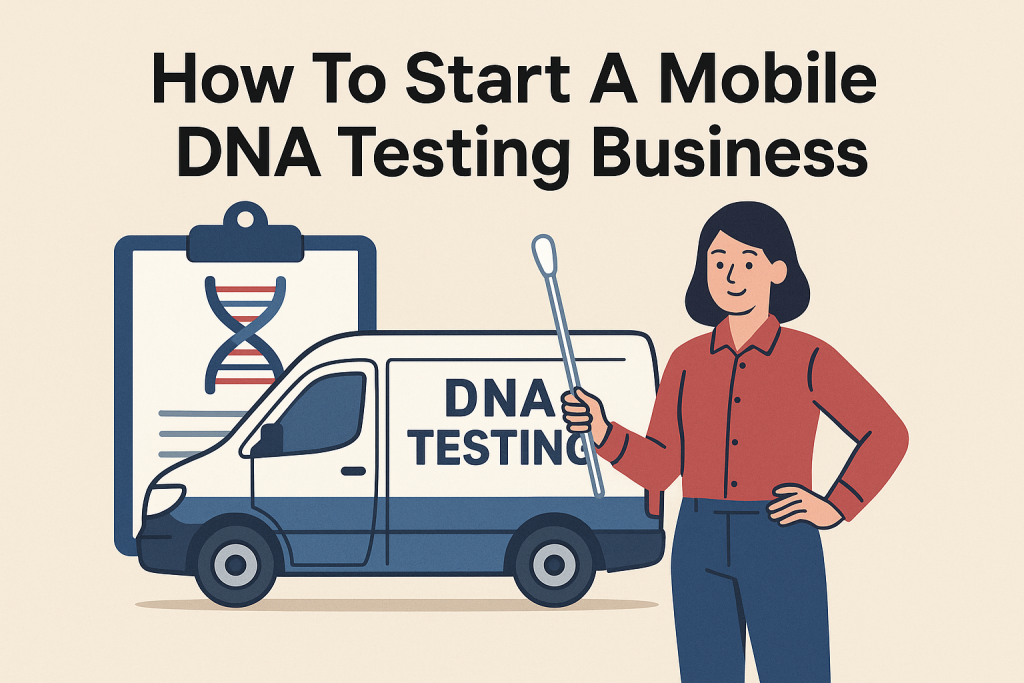The world of personalized health solutions is booming, with genetic analysis services leading the charge. Recent data shows this sector’s value surpassed $15.5 billion in 2022, with experts predicting it could triple by 2033. Entrepreneurs now have a golden chance to tap into this demand through innovative service models that prioritize accessibility.
Mobile genetic services stand out by blending advanced science with doorstep convenience. Unlike traditional labs, these operations meet clients where they live or work – whether for ancestry tracing, health risk assessments, or family relationship verification. This approach eliminates the need for physical clinic spaces while expanding potential customer bases across entire regions.
Three key factors make this model appealing for new ventures. First, operational costs stay lower than brick-and-mortar facilities. Second, flexible scheduling allows serving both urban and rural populations. Third, partnerships with certified laboratories ensure professional-grade results without massive equipment investments.
As public interest grows in preventive healthcare and personalized wellness plans, mobile services fill a critical gap. They deliver complex scientific insights through user-friendly experiences – from sample collection to digital report delivery. This combination of medical credibility and modern convenience positions mobile operators for sustained growth in our increasingly health-conscious society.
Key Takeaways
- Genetic analysis sector projected to triple in value by 2033
- Mobile models reduce overhead costs by 40-60% compared to traditional labs
- Services cater to growing demand for health predisposition and ancestry insights
- Flexible operations enable nationwide customer reach
- Partnerships with certified labs maintain scientific credibility
Understanding the DNA Testing Market Landscape
Advances in biotechnology are making genetic analysis more accessible than ever. The global market thrives on two forces: cutting-edge science and growing public curiosity about personal health insights. Nearly half of all services focus on wellness predispositions, proving people want actionable data to shape lifestyle choices.
Current Trends and Growth Projections
Technological leaps drive expansion across the industry. Sequencing costs dropped 80% since 2015, while AI-powered tools deliver faster, clearer insights. Healthcare providers now use genetic data to tailor treatments, pushing personalized medicine into mainstream care.
| Market Segment | Primary Focus | Growth Driver |
|---|---|---|
| Direct-to-Consumer | Ancestry & Wellness | Home kit convenience |
| Clinical Diagnostics | Medical Conditions | Insurance coverage |
| Research/Academic | Scientific Studies | Government funding |
Emerging Consumer and Health Applications
New uses appear as technology evolves. Pharmacogenomics helps match medications to genetic profiles, reducing side effects. Nutrigenomics crafts diet plans based on DNA, while carrier tests aid family planning decisions. These innovations create fresh opportunities for consumer-focused services.
Portable lab equipment and cloud-based analysis platforms let companies offer reliable dna testing without fixed locations. This mobility aligns perfectly with modern demands for hassle-free health solutions.
Legal & Regulatory Requirements in the DNA Testing Industry
Adhering to regulations isn’t just mandatory—it’s a competitive advantage. Genetic service providers must balance scientific innovation with strict compliance frameworks. Three pillars form this foundation: data protection laws, lab certifications, and medical device oversight.
HIPAA, GDPR, and Data Privacy Essentials
HIPAA rules guard health information like genetic reports in the U.S. Your operation needs encrypted databases and access controls. European clients? GDPR compliance becomes non-negotiable, requiring clear consent forms and data deletion options.
Every privacy policy should explain how you collect, use, and store sensitive details. Clients increasingly value transparency—63% of consumers prioritize data security when choosing genetic services according to recent surveys.
CLIA Certification and FDA Considerations
Lab accuracy matters. CLIA certification proves your processes meet federal quality standards. This credential requires regular audits and staff competency checks. Mobile operations often partner with CLIA-certified labs to reduce startup costs.
The FDA oversees tests predicting health risks. If your service diagnoses conditions or suggests treatments, expect extra scrutiny. Some kits need pre-market approval, while others fall under enforcement discretion guidelines.
If you’re considering entering the non-emergency medical transport sector, don’t miss our comprehensive breakdown of launching a successful medical transportation venture.
Conducting Comprehensive Market Research
Unlocking opportunities in genetic services begins with precise market intelligence. Nearly 78% of successful ventures credit detailed audience analysis as their foundation for growth. This process reveals who wants your services and why they’ll choose you over competitors.
Entrepreneurs exploring the healthcare and genetic testing industry often research dna test business opportunities to understand market potential and regulatory requirements. Many investigate dna testing business opportunity models including direct-to-consumer services, laboratory partnerships, and specialized testing niches.
Understanding how to start dna testing involves navigating complex regulatory frameworks, laboratory certifications, and quality control standards required for genetic analysis services. This emerging market requires significant investment in equipment, specialized staff, and compliance with healthcare regulations while addressing growing consumer interest in ancestry, health, and wellness insights through genetic testing services.
Mapping Your Genetic Service Blueprint
Start by slicing demographic data like a lab technician. Urban professionals aged 30-45 often seek health predisposition insights, while rural communities value ancestry tracing. Income brackets and health awareness levels further refine your target groups.
Current trends show shifting preferences. Pharmacogenomics—tailoring medications to genetic profiles—gains traction among chronic illness patients. Fitness enthusiasts increasingly demand nutrigenomic diet plans. Spotting these patterns early helps shape service strategies.
Competitor evaluation separates market leaders from strugglers. Study their pricing for ancestry kits versus premium health reports. Note gaps in mobile service areas or underserved ethnic groups. One Texas-based company doubled sales by focusing on Hispanic heritage analyses.
Validation turns assumptions into action. Conduct pilot tests in diverse neighborhoods before full launch. Offer free sample collections at community centers—65% of trial users convert to paying customers when services match their core needs.
-
If you’re seeking a unique business model with recurring revenue potential, explore our insights on starting a mobile DNA testing company.
Business Planning and Operational Setup
Launching a genetic analysis venture demands careful financial strategy and logistical precision. Smart resource allocation separates thriving operations from struggling ones, with initial investments ranging from $50,000 to half a million dollars. Three pillars support success: precise budgeting, proper tools, and compliant frameworks. If you’re mapping out your startup costs, be sure to factor in business license fees, which can vary significantly across states and municipalities.
Budgeting Essentials and Lab Tools
Equipment choices directly impact service quality and scalability. Mobile models prioritize compact, durable gear that withstands transportation. Consider these core components:
| Equipment | Price Range | Key Purpose |
|---|---|---|
| Portable PCR Machine | $2,000-$8,000 | DNA amplification |
| Microcentrifuge | $800-$3,500 | Sample preparation |
| Compact Sequencer | $75,000-$300,000 | Genetic code reading |
| Temperature-Controlled Storage | $1,200-$4,000 | Sample preservation |
Licensing requirements vary by state but typically include clinical laboratory permits and HIPAA-compliant data protocols. Factor in $2,500-$15,000 for initial certifications depending on your service area. If you’re considering entering the last-mile delivery space, this detailed breakdown on setting up a courier business will help you navigate the process efficiently.
Structural Foundations for Growth
Most new ventures choose LLC formations for personal asset protection and tax flexibility. Corporations better suit teams seeking investor funding or planning multi-state expansions. One Midwestern startup reduced annual fees by 32% through proper entity selection.
Ongoing expenses like collection kits ($8-$25 per unit) and mobile lab maintenance ($1,800/month) shape pricing strategies. Regular financial reviews help maintain profitability while expanding service offerings.
How To Start A Mobile DNA Testing Business
Successful mobile operations thrive on smart planning and robust systems. Route optimization software can reduce travel time by 35% while increasing daily appointments, according to logistics experts. Service models vary based on client needs:
Service Frameworks and Execution
Residential visits dominate demand for ancestry reports and family relationship verification. Corporate partnerships cater to workplace wellness programs – a sector growing 22% annually. Hybrid models combine scheduled stops at community centers with on-demand bookings.
| Model Type | Key Features | Ideal Clients |
|---|---|---|
| Home Visits | Flexible scheduling Personalized service |
Families & retirees |
| Corporate Programs | Bulk testing Custom reporting |
HR departments |
| Pop-Up Clinics | High-volume days Community outreach |
Rural populations |
Tech Solutions for Field Operations
Portable centrifuges and thermal shipping containers maintain sample viability during transit. Cloud-based LIMS platforms let technicians update records in real-time from any location. GPS-enabled scheduling apps automatically cluster appointments by proximity.
Temperature monitoring sensors provide continuous updates during transport – critical for preserving genetic material. One Midwest operator achieved 99.8% sample integrity rates using dual cooling systems in their mobile units.
Digital portals streamline results delivery, with 72% of clients preferring encrypted email over physical reports. Automated reminders reduce no-show rates by 40%, ensuring efficient use of field staff time.
Strategic Marketing & Sales Techniques
Effective outreach bridges scientific expertise with consumer needs. Digital channels now drive 83% of service discovery in the genetic analysis field, making online visibility essential. Successful campaigns combine technical precision with relatable storytelling.
Mastering Search Visibility
SEO optimization turns curiosity into conversions. Target phrases like “at-home ancestry reports” or “personalized health insights” to attract qualified traffic. Localized keywords (“genetic testing Boston”) capture nearby potential customers seeking convenient options.
“Content that answers real questions ranks higher and builds credibility faster.”
Educational blogs explaining epigenetics or carrier test benefits position your team as trusted advisors. Pair articles with video explainers – viewers retain 95% more information than text-only readers.
Social Proof Through Digital Channels
Platforms like Instagram and TikTok thrive on authentic stories. Share client testimonials about life-changing health discoveries or family reunions. Behind-the-scenes lab tours demystify the science while humanizing your brand.
| Platform | Content Strategy | Engagement Boost |
|---|---|---|
| Live Q&A sessions | 42% avg. increase | |
| Industry white papers | 28% professional leads | |
| YouTube | Sample collection tutorials | 3x watch time |
Email campaigns nurture relationships post-test. Automated sequences can remind clients to share results with healthcare providers or offer upgrade options. Limited-time discounts for referrals turn satisfied customers into active promoters.
Paid ads on health-focused platforms outperform generic networks. Target users researching chronic conditions or genealogy hobbies. Retargeting keeps your services top-of-mind during decision-making phases.
Building Key Partnerships & Leveraging Advanced Platforms
Smart collaborations fuel success in genetic services. Partnering with established laboratories and technology providers accelerates growth while maintaining scientific rigor. These relationships let new ventures focus on client acquisition rather than infrastructure development.
Strategic Lab Alliances
Reliable lab partners process samples at $50-$200 per test, depending on complexity. Look for CLIA-certified facilities with rapid turnaround times – 72-hour results keep clients satisfied. White-label options allow branding tests without owning equipment.
Platforms like OmicsEdge simplify entry into the market. Their pre-built systems handle analysis, reporting, and compliance. This cuts setup costs by 65% compared to independent lab construction.
Healthcare Network Integration
Physician partnerships create steady referral streams. Clinics often recommend trusted services for hereditary cancer screenings or medication compatibility tests. Shared portals let doctors access client results securely.
“Collaborative models reduce patient wait times by 40% while expanding practice offerings.”
Corporate wellness programs offer another avenue. Employers increasingly fund genetic health assessments as employee benefits. These contracts provide predictable revenue and bulk testing opportunities.
Strong agreements protect both parties. Define data ownership, liability terms, and exit clauses clearly. Regular performance reviews ensure partners meet accuracy standards and delivery timelines.
Integrating Technology and Ensuring Data Security
Modern genetic services thrive on robust digital infrastructure. Secure tech solutions protect sensitive information while streamlining operations, creating trust that drives client retention.
Smart Systems for Sample Management
Cloud-based LIMS platforms revolutionize sample tracking. These tools automatically log collection times, storage conditions, and analysis stages. Real-time updates prevent errors during transport or processing.
Encrypted storage protocols meet HIPAA and GDPR requirements. Multi-factor authentication adds extra protection for health records. Regular audits ensure systems adapt to evolving data security standards.
Mobile teams benefit from portable scanners that sync with central databases. GPS timestamps verify chain-of-custody procedures. One California operator reduced paperwork by 80% using integrated digital workflows.
Partnering with established tech providers accelerates implementation. Many platforms offer customizable dashboards for different service types. This flexibility supports growth while maintaining strict compliance across regions.







